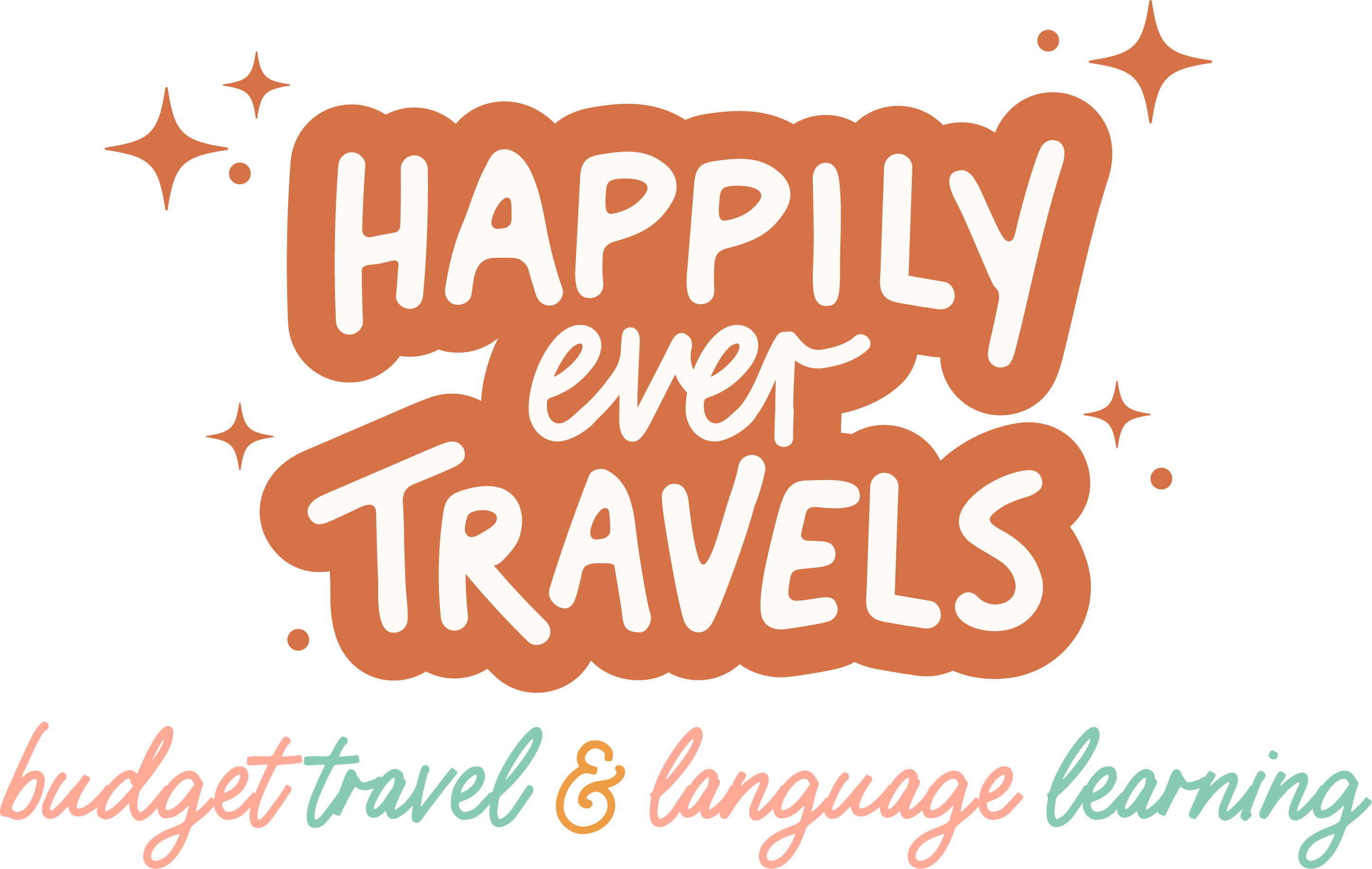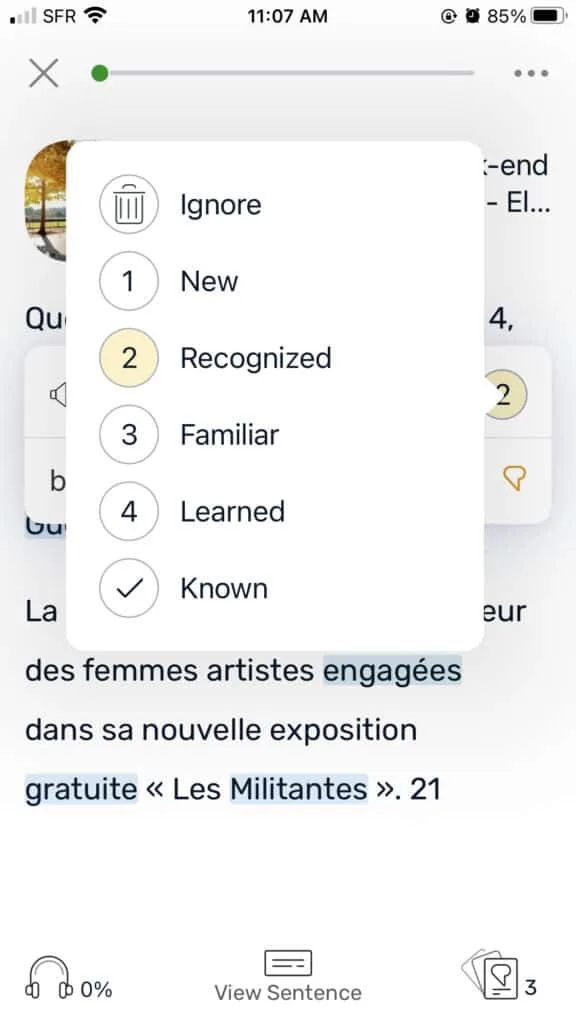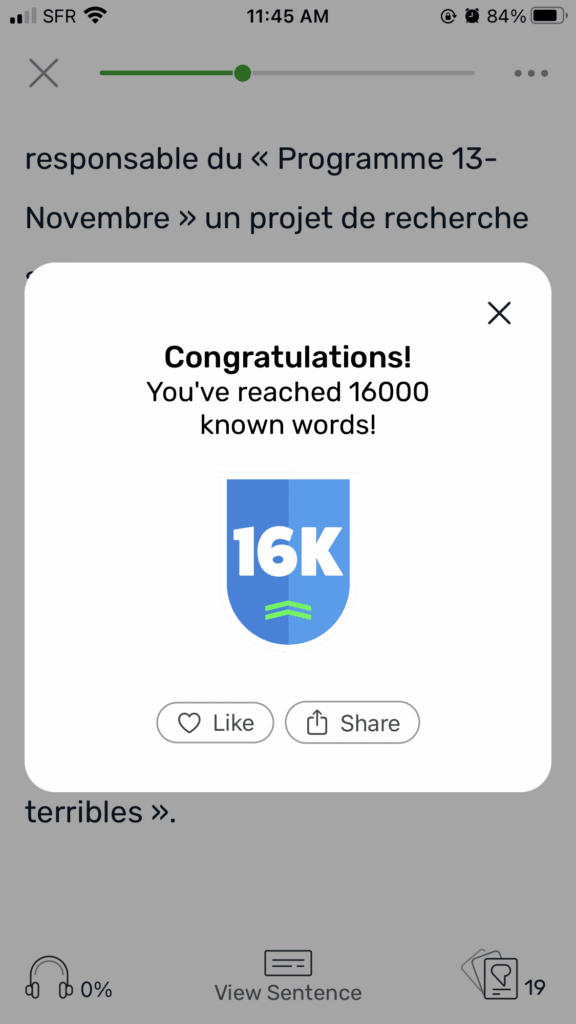As more and more people discover this wonderful nation, the demand for Bulgarian language courses has increased. So, does Duolingo have Bulgarian, and if not, why not?
Is There a Bulgarian Duolingo course?
Unfortunately, there isn’t a Bulgarian course on Duolingo.
Bulgaria is fast becoming a popular tourist destination, but seemingly not fast enough for Duolingo to build a course and release it. They do only have the resources to release a set amount of languages a year, but so far, Bulgarian hasn’t made the cut.
6 Alternative Apps to Learn Bulgarian That Aren’t Duolingo
Since it seems like Duolingo has let us down by not offering a Bulgarian course, let’s check out some alternative apps to Duolingo, with resources already built in!
1. Mondly
If you’re looking for the closest alternative to Duolingo, you’re probably going to want to download Mondly. With gamified lessons that include flashcards, matching games, fill-the-gaps, and more, Mondly definitely makes learning Bulgarian feel a lot more fun.
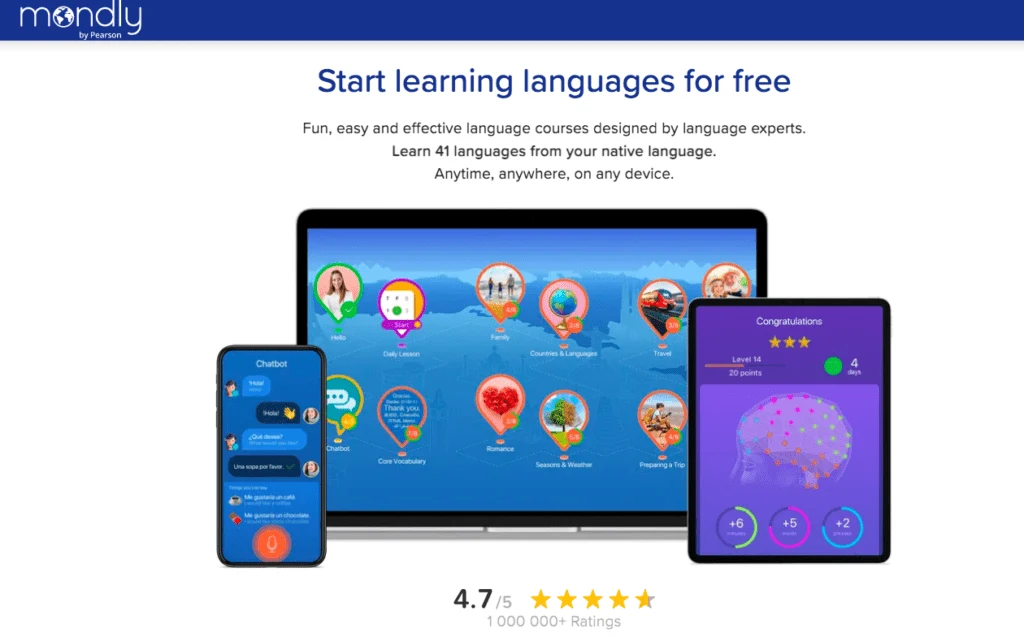
You even get to enjoy leaderboards against your friends and other users. After a couple of sessions on Mondly, you’ll forget all about Duolingo.
2. Memrise
Although Memrise isn’t specifically a language-learning app, it does have a ton of Bulgarian language resources on its platform.
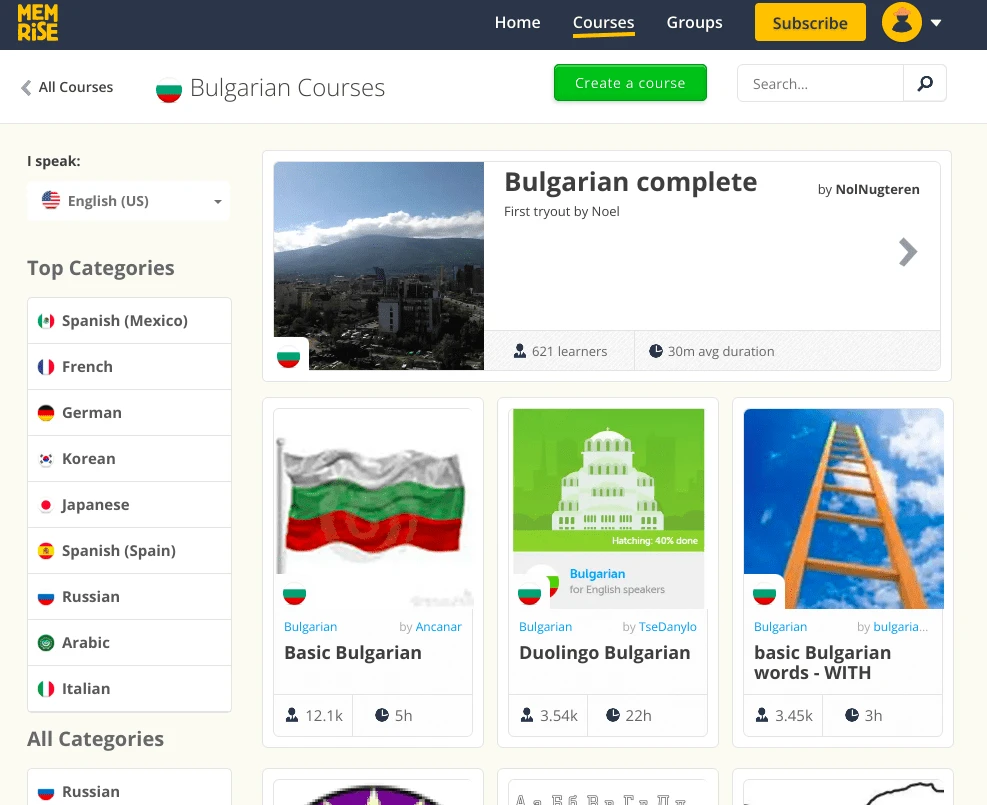
As it’s user-generated, and designed for revision and studying, you can find a whole host of old language learning resources from quizzes to presentations to video and audio clips actually in Bulgarian.
It’s not a set course or journey, so you have to find the resources and piece them together, but it can be a useful supplementary resource to another Bulgarian language tool.
3. LingQ
LinQ is my Duolingo alternative of choice. I use this app every single day and I see myself using it forever. Why? Because it’s not actually the app that is teaching me the language, it’s native materials like Youtube Channels, Netflix, and Cosmopolitan Magazine.
If you are someone who wants to immerse themselves in native materials instead of resources made for learners, LingQ is hard to beat.
It basically makes it so you can measure the words you are exposed to while reading or watching things in your target language. You can import anything from across the internet and it keeps track of words you’ve seen before, words you have learned, and words you have struggled to remember.
For example, here’s an article from Elle that I uploaded to LingQ. All the words in yellow are words that I’ve seen before but didn’t know, so I highlighted them. The white words are words I’ve read and knew, and the blue words are ones I’ve never seen before. Paris is highlighted here because, in some contexts, it means bet or wager and not the city in France.
When you see a word you don’t know, you can highlight it, then every time you see that word in other articles or video, if you recognize the word, you can click on it and change the level so you can keep track of new vocabulary that you are learning in context.
The app keeps track of every word you learn and you can review them in the flashcard section of the app. But for me, this is a great way to gamify reading and watching TV in my target language. I love getting notifications that I’ve reached another 1,000 words.
I can also say that as someone who absolutely detests flashcards and memorizing words, this method actually works.
By encouraging myself to read and consume as much content in my target language as possible, I am actually remembering and learning words quickly and being able to recall them in my iTalki classes.
The main criticism of LingQ is that the user interface is not the best and it doesn’t look very modernized. However, once you get past this, you can use this app to start to reach more advanced levels of your language by learning a ton of vocabulary.
You can use the app for free but a lot of the features are limited. I think that if you were ever going to pay for a language-learning app, let it be this one!
The price varies depending on how long you subscribe, but it includes all languages on the app. The price is between $7-$13 per month.
In my opinion, LingQ is the best app on this list if you are not a beginner.
4. Ling
In addition to having a ton of gamified lessons and quizzes to check your progress, Ling also has chatbots where you can really put your knowledge to the test.
Roadtest real conversations against Ling’s AI interface on a set topic to see just how far you’ve come or where the gaps in your Bulgarian skills might be.
It’s an extra layer of language learning that is refreshing after doing so many gamified lessons.
5. Simply Learn Bulgarian
As the name suggests, this particular app is pretty simple in its interface and helps you to learn Bulgarian in a number of different ways. Learn and improve your vocabulary skills through flashcard games.
Test your knowledge and progress with interesting quizzes. You can even improve pronunciation and listening skills with clips recorded by real Bulgarian native speakers.
6. Clozemaster
Want to take your Bulgarian to the next level but can’t afford a ticket to Bulgaria to immerse yourself? Check out Clozemaster’s website or app where you can practice intermediate and advanced Bulgarian with plenty of context clues.
Too often language apps make us learn a bank of words without context, or give us all the animal phrases but nothing useful like checking into a hotel or ordering in a restaurant.
Clozemaster focuses on practicality.
5 More Ways to Learn Bulgarian (That Aren’t Language Course Apps)
If you’re not into app-based language learning or want another type of resource to help you learn Bulgarian alongside an app, here are some great options.
1. iTalki
Probably the second best way to learn a new language after immersing yourself in a culture and country where it’s frequently spoken is one-on-one tutoring.
Now, as we’ve already established, Bulgarian native speakers are predominantly in Bulgaria, so it’s difficult to find a tutor in your neighborhood. That’s where iTalki comes in.
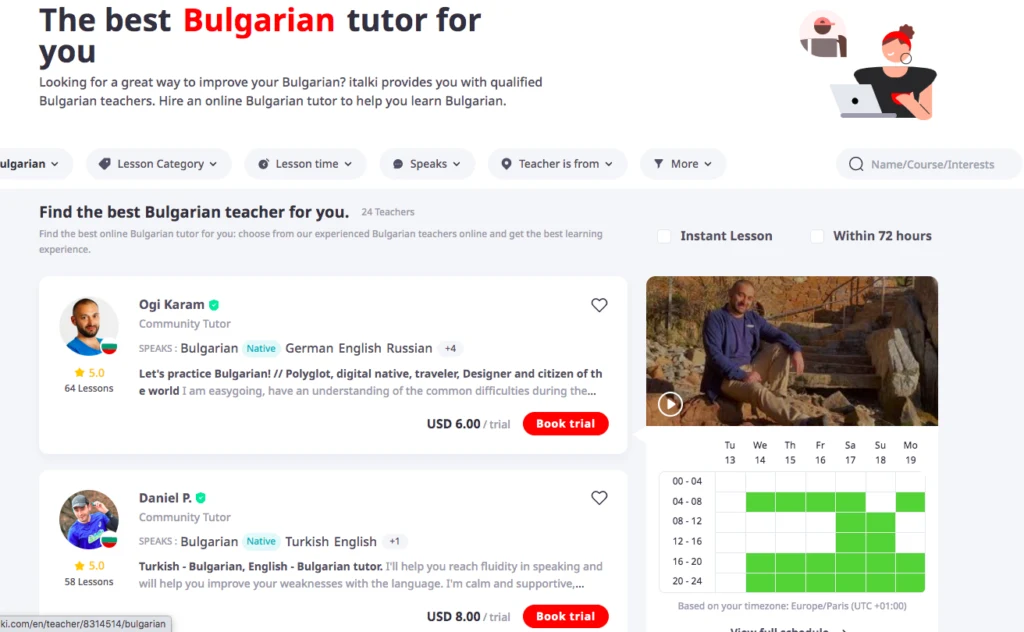
iTalki is a platform that connects language students with native-speaking tutors from all over the world.
All the lessons are held over video chat in real-time, so you can benefit from being corrected, having tailored lesson plans, and proper feedback on your progress, all without having to leave your house.
Simply pick from the list of Bulgarian teachers, filtering by price, and timezone, and reading previous student reviews as you go!
2. Language Guides & Dictionaries on Amazon
If in doubt, stick with the classics. Bulgarian dictionaries, textbooks, and phrasebooks (this one is by Lonely Planet and got tons of good reviews) are all available online and work really well as reference tools.
You’ll probably be hard-pressed to find a Bulgarian language textbook just sitting on the shelf at your local bookstore, but they should be able to order one for you.
Step by Step: Bulgarian Language and Culture for Foreigners is one of the most highly-recommended textbooks, especially for beginners.
It has a specific focus on Bulgarian grammar, which can be tricky, and is something that’s normally overlooked by language-learning apps. So, you might want to buy this book alongside your app-based Bulgarian study.
3. Bulgarian YouTube Channels (for Native Speakers & Learners)
If you want to improve your pronunciation, you first need to hear the language in action. Given that the vast majority of Bulgarian speakers actually live in Bulgaria, you might not hear it organically.
Get a feel for the sounds and flow of Bulgarian by watching clips on YouTube from Bulgarian vloggers to language courses on the platform itself, to videos featuring Bulgarian news shows.
I recommend using subtitles in Bulgarian and not in your native language. Even listening to it and not understanding it gives your brain the opportunity to get used to the sound of Bulgarian.
You can also speed up or slow down any YouTube video by clicking on the settings icon, playback speed, and changing it faster or slower.
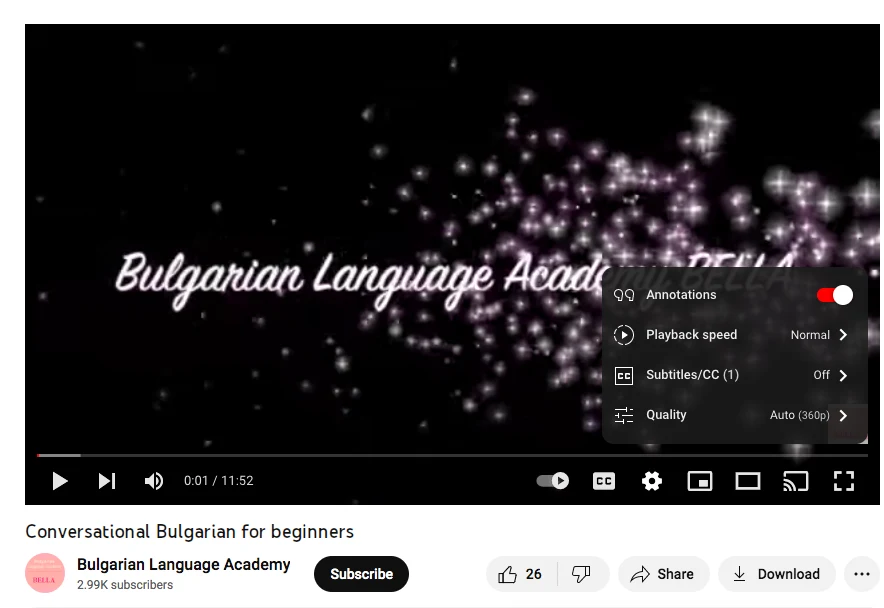
A few good channels to check out are BulgarianPod101 (also listed as a podcast if you like podcasts better!) and Bulgarian Language Academy.
If you’re more advanced, try searching on YouTube in Bulgarian using things you’re interested in to find vloggers and Youtubers that make content for Bulgarians and not for learners. Combining that with the LingQ app is my favorite way to learn languages!
4. BulgarianPod101
Who doesn’t love listening to a podcast while you’re out and about doing things? They’re a great way to learn about something in a passive, hands-free way – ideal for walking the dog, the morning commute, or just when you’re at your desk.
BulgarianPod101 is a popular Bulgarian language podcast that helps you learn basic words and phrases. Hosted on its own app, you can also access video clips for additional context.
5. Bulgaro.io
If you want a desktop alternative to Duolingo, Bulgaro.io has to be the Bulgarian language learning tool for you. It was actually designed with Duolingo in mind which is why the interface looks so familiar!
Choose from lessons on different topics to quizzes, games, and more. If you’re looking for a fun and simple way to learn Bulgarian on a desktop, this is a great place to start.
Learn Bulgarian Even Without a Duolingo Course
Despite Bulgaria becoming popular as both a summer and winter destination, Duolingo still hasn’t developed a Bulgarian language course on its wildly popular platform. With the Incubator being open to the public, we also know that it’s not going to be developed or released anytime soon.
Luckily, there are plenty of other apps, platforms, and resources that do offer Bulgarian language learning courses, so why not give one or two of them a go today?
Is There Going to Be a Bulgarian Duolingo Course?
The cool thing about Duolingo as a business is that they have a platform called the Duolingo Incubator which allows you to see which courses are currently in development.
As Duolingo courses can take a couple of years to develop, test, and release, we know pretty far in advance which courses are going to be created in the future.
So, it’s easy for us to say that Bulgarian is not going to be released on Duolingo any time soon. With limited resources and popular languages being requested all the time, Bulgarian seems to have slipped down the list.
Why Isn’t Bulgarian on Duolingo? 3 Possible Reasons
There are probably a few reasons why Duolingo doesn’t have a Bulgarian course.
1. Not Enough Demand
The main reason that Bulgarian isn’t on Duolingo is that it just isn’t that popular.
Given that there are 8 million speakers and 5.7 of those live in Bulgaria, which is something that Duolingo doesn’t cater to anyway, it’s not surprising that they haven’t designated resources to create this course.
That being said, they’ve created courses for languages with much fewer speakers, and even fictional languages.
2. Category 3 Difficulty & Cyrillic Alphabet
The next reason why Bulgarian isn’t on Duolingo might be because it’s classified as a Category 3 difficult language to learn and uses the Cyrillic alphabet.
This means that their existing course structure would need to adapt to suit the nuances, challenges, and teaching styles of this tricky language.
However, Duolingo has a Russian course that also uses the Cyrillic alphabet, and has tackled Category 3 languages before, so the precedent is there!
3. Duolingo Got Rid of the Language Incubator
Duolingo also used to work with native language volunteers to help build, shape, and test their courses in the Incubator stage.
This helped them not only to produce more courses per year but was super beneficial with trickier languages as there’s normally a specific way or order to teach them, which native-speaking volunteers – who were usually language teachers – understood and knew.
They’ve since brought all development in-house so it has limited speed, quantity, and difficulty levels when it comes to Duolingo courses.
Read More About Duolingo:
- Everything You Need to Know About the Duolingo Owl (Including Memes)
- The Complete Duolingo Podcast Guide
- Everything You Should Know About the Duolingo English Exam
- What is the Happy Hour on Duolingo?
- How Can I Alter the Language on Duolingo?

Dayna Brockbank is a travel and language-learning blogger who has lived around the world but has now settled in Nice, France. She speaks 3 languages at varying levels of fluency: Spanish, Italian, and French, and graduated with a Bachelor’s in Spanish Education. She and her husband focus on making travel part of life by living cheaply and traveling on a budget.
